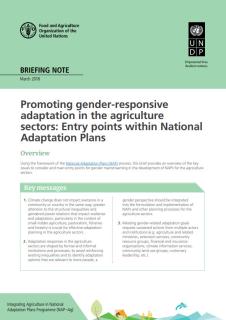
Using the framework of the National Adaptation Plans (NAP) process, this brief, Promoting Gender-responsive Adaptation in the Agriculture Sectors: Entry Points within National Adaptation Plans, provides an overview of the key issues to consider and main entry points for gender mainstreaming in the development of NAPs for the agriculture sectors.
Key messages include:
- Climate change does not impact everyone in a community or country in the same way; greater attention to the structural inequalities and gendered power relations that impact resilience and adaptation, particularly in the context of small-holder agriculture, pastoralism, fisheries and forestry is crucial for effective adaptation planning in the agriculture sectors.
- Adaptation responses in the agriculture sectors are shaped by formal and informal institutions and processes; to avoid reinforcing existing inequalities and to identify adaptation options that are relevant to more people, a gender perspective should be integrated into the formulation and implementation of NAPs and other planning processes for the agriculture sectors.
- Meeting gender-related adaptation goals requires sustained actions from multiple actors and institutions (e.g. agriculture and related ministries, extension services, community resource groups, financial and insurance organizations, climate information services, community land use groups; customary leadership, etc.).
